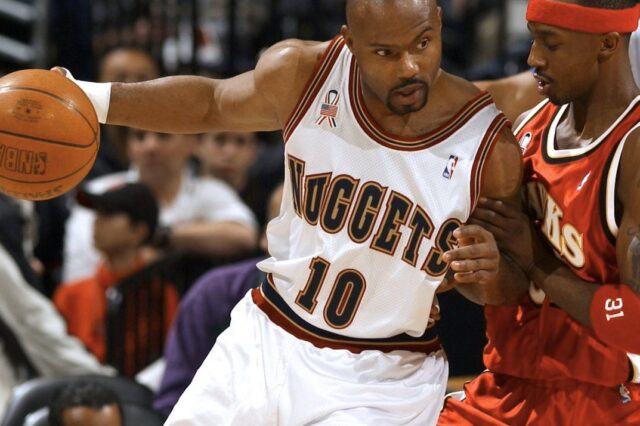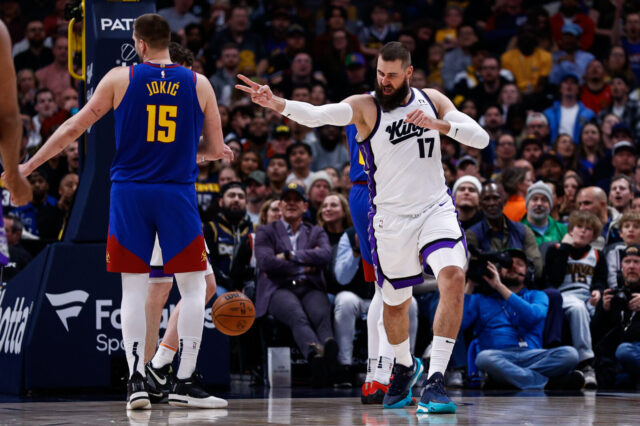If you’re not familiar with Film Fridays, each Friday, I’ll be looking at some recent Denver Nuggets’ games, lineups or something else from a film aspect to try and bring you a piece of content that you’re not getting somewhere else. Feel free to give any feedback positive or negative in the comments or find me on Twitter.
There is a famous African proverb that goes “It takes a village to raise a child.” The Denver Nuggets aren’t raising a child, but absolutely need an entire village to secure a series victory in this playoff series. Through three games, they’ve played nine players in 40 or more minutes and 10 have seen 16 or more. The Portland Trail Blazers have just seven players that clear the 40-minute mark with Enes Kanter just missing the cut at 38 minutes.
With all of the injuries Denver has dealt with combined with the trade of Gary Harris and R.J. Hampton, which further hurt their guard depth, it’s almost impressive that they’re still trotting out guards that are giving them rotation-level minutes in the playoffs against a team with an outstanding duo of guards. Up 2-1 in the series, Denver has recaptured home-court advantage, and they’ll be looking to end this series as quickly as possible to give Will Barton and P.J. Dozier a better chance at getting to the court.
Through three games, we have yet to see a signature Nikola Jokic or Michael Porter Jr. performance where Jokic puts up a triple-double or MPJ pours in 10 points in two minutes in the final five of the game. Instead, we’ve seen Austin Rivers put in 21 points while shooting 50 percent from 3-point range on 10 attempts, including a 3-pointer late in their Game 3 win, and Paul Millsap turned back the clock in Game 2 with some grown-man ball against the Blazers when they went small. If the two stars don’t put up one of those signature moments, what’s going to get the job done in the series?
Dominate the Non-Nurkic Minutes
Jusuf Nurkic has fouled out in two straight games against the Nuggets, and he’s averaging over five personal fouls per game. He’s currently +21 in the series right now in plus-minus. When he’s off the floor, Denver is shooting 62.7 percent from 2-point range compared to just 50 percent when he’s on the floor. Whether it’s Jokic, or, as it is on this play, Paul Millsap, the non-Nurkic minutes are huge for Denver. After averaging 16 minutes per game in the first two games of the series, Kanter played just six minutes in Game 3. On this play, Millsap gets a switch with Norman Powell on him and a chance to drive to the rim after getting Powell to close out. Kanter could have slid over and tried to redirect him, and he just waves his arm at him while Millsap goes to collect the easy bucket.
Instead of Millsap doing the damage inside with Nurkic on the sideline, it’s Jokic. Robert Covington is, in my opinion, the Blazers’ best defensive player. While Nurkic may have the better stats, Covington’s ability to defend multiple positions effectively is a huge asset to this team. On this play, Covington is tasked with guarding Jokic after Nurkic fouled out with 5:17 remaining. He’s there on the play, but there just isn’t much he can do. Jokic is big and strong enough to overpower centers. No matter how stout Covington is, Jokic can back him down to get to his spot before getting to the rim for easy points.
Make Lillard Work
Damian Lillard is averaging 37.7 points per game through three games, and, while he’s still shooting a decent mark, Denver is making him work more and more to get there. He attempted 31 shots in Game 3 including 16 3-point shots. This is the prime example of how to handle a player of Lillard’s caliber. Unless you have a legitimate lockdown defender that’s going to make it next-to-impossible for him to score, you have to send everyone at him to wear him down. On this play, the Blazers have the ball for eight seconds. Lillard has the ball for all eight of them, and he has three different defenders make a play on him before Facundo Campazzo eventually blocks the ball down off of Lillard’s leg before it goes out of bounds. Lillard is going to score. There is no way around that, but Denver is making him work to put up those points.
This play is beautiful for a couple of reasons. For one, it emphasizes the first point that we talked about in terms of attacking the basket with Nurkic off the floor. Second, it goes back to what we talked about when previewing Portland before the season officially came to a close. You’re attacking Lillard on the defensive end where he’s not in his comfort zone while wearing him out. Lillard gets hit by a Jokic screen twice on this play, and he’s forced to switch off of Campazzo and onto Jokic. Jokic gets the ball back, and it’s an easy jaunt to the rim. Plays like this throughout the game are how you end up with Lillard being worn down by the end of the series considering he’s sporting a usage rate North of 35 percent while averaging over 40 minutes per game through three games. For reference, no one on the Nuggets is averaging more than 34.3 minutes per game.
Step Up or Step aside
This was effectively the shot that ended the game for Portland. With 1:24 remaining, Denver now leads by eight, and they’re in the territory where Portland may be forced to start fouling. With Barton and Jamal Murray out, Denver doesn’t have the raw confidence shooting that they normally would. MPJ has that, but the guard position doesn’t. How do you solve that? You put Rivers, who has been in the NBA for nine years, on six teams in that time span and wasn’t on a team for 10 weeks in the middle of this season, into the starting lineup. Rivers is a career 35 percent 3-point shooter, but he has the confidence of someone that shoots nearly 50 percent even when being guarded by two defenders. Rivers is being guarded by C.J. McCollum, and he is just one pass away from Jokic. As he sees McCollum start to cheat towards Jokic, he’s getting himself in position to catch and shoot as soon as the ball hits his hands. On catch-and-shoot opportunities, he’s shot nearly 20 percent better in the playoffs and the regular season than on pull-up shots. He knows his role, and he’s thriving in it.
JaMychal Green was 2-of-7 in the series through two games. He was 0-of-3 from 3-point range, and he had been largely a non-factor on offense. On this play in Game 3, Green must have heard someone say something about on a personal level because this is just all grit, and these are the plays that win you a series. Green is listed at 6’8,” and he’s never been an elite rebounder. On this play, he’s against Carmelo Anthony and Kanter, who was the second-best rebounder in the NBA this season among qualified players. It doesn’t matter. Green keeps working to get the ball to himself. The play doesn’t end there. He settles and goes right at Kanter before grabbing his own offensive rebound and getting the putback layup. Green isn’t going to be a big source of offense every night, but, if he can bring you a few hustle plays like this every game, there isn’t much more you can ask from him.
For those of you that are still here, remember to leave your feedback in the comments or over on my Twitter, and have a fantastic film-filled Friday.


